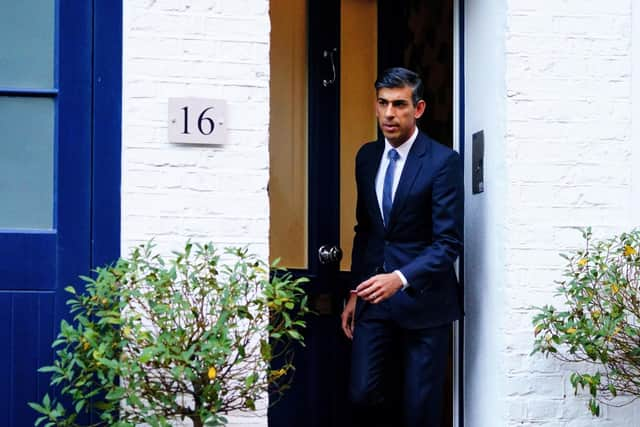With Sunak and Hunt in control, the next election will be a contest - not a wipe out - John McLellan
Certainly not gleeful like BBC newscaster Martine Croxall, but the prospect of going out on the campaign trail on behalf of someone so recently ejected was for many too awful to contemplate and it would have been a result if activist strength was only decimated. Over the weekend, I lost count of the number of lifelong Conservative voters who couldn’t believe that, for some senior MPs, July’s mass resignations must have been a figment of the imagination, that the privileges committee investigation wasn’t taking place, and the ‘greased albino piglet’ could be on the final ballot and win a popularity contest amongst the Conservative rank and file which endorsed Liz Truss. They were not members with a say in these contests but people who have always wanted a strong Conservative voice in Scotland, just not of the booming Johnson variety, and certainly not twice.
Faced with swelling parliamentary support for his rival, it appears the same instinct for long-term survival which led him to withdraw in 2016 has kicked in again. “You can’t govern effectively unless you have a united party in parliament,” he wrote, recognising that with around 140 declarations for Rishi Sunak by Sunday night and a pile of no confidence letters against him only three months ago, it was hard to see how party managers could inform King Charles at the end of the week that he commanded the confidence of the House of Commons. We might never know if he really did have the necessary backing of over 100 MPs, but at least the King has not been thrust into what could have gone from a party debacle into a constitutional crisis if he knew, like everyone else, that the Prime Minister-in-waiting did not have the full backing of his own side. Now, the privileges inquiry will be a sideshow, not another knife-edge drama in which the country’s leader could have been facing suspension.
Advertisement
Hide AdAdvertisement
Hide AdTo Prime Minster Sunak ─ and who would have thought that at the start of September ─ falls the task of restoring the credibility and stability of both the Conservative Party and the UK economy, with precious little time or room for manoeuvre after an extraordinary month. At least the markets which destroyed Liz Truss’s plans have continued to go in the other direction, with the pound climbing against the dollar and the cost of government borrowing falling yesterday morning. It maybe months, possibly years, before what we once knew as ‘normal business’ returns, but at least a route which is consistent with what he said during the summer’s fractious leadership election process has opened up.


Rishi Sunak shares some responsibility for high levels of government debt, but as the first lockdown kicked in, he was right to spend millions on business relief and furlough as thousands faced the dole, and he was not to blame for the medically-driven decision to lengthen lockdown which racked up the bill. Not flash, just Gordon, was the Labour Party’s way of presenting their Prime Minister’s dour reputation going into the 2010 election, and while Mr Sunak is far from brooding or terse, the times do call for the kind of unflashy steadiness a Sunak-Hunt combination can offer. Now the next election should be a contest, not the foregone conclusion of a wipe-out the polls were predicting last week.
So much is hanging on the content and presentation of the medium-term plan on October 31 and Chancellor Jeremy Hunt, presuming he is kept in post, has already signalled it won’t be pretty. The problem for the opposition is that, having attacked the Truss programme as irresponsible, they will be compelled to produce their plan which, if public spending is not to be cut and services are to be unreformed, will mean going into the contest on a tax-raising platform. It will need to be a lot more than just trying to hammer the most well-off.
The utter chaos last Wednesday night as authority broke down was fully exposed in the Sunday newspapers, but just as quickly as the Truss administration collapsed, despair has turned into belief that credibility and competence will take its place, even if the medicine is hard to swallow. As former Bank of England Governor Mervyn King said on Sunday, having low US-style taxes is impossible as the same time as guaranteeing European levels of public spending and while the Conservative Party should always be true to its low-tax roots, the events of the past two years require a new understanding of what represents low tax in such circumstances.
Spending millions to save jobs as the pandemic gripped was the right thing to do in the first lockdown when death rates soared, and the end was not in sight. Spending millions to help Ukraine defend itself was the right thing to do when the aggressor would have turned its sights on other free Eastern European countries. Spending millions on helping families and businesses survive this winter’s energy crisis was the right thing to do. But, as Mr Sunak said all summer, it requires honesty about what is needed to balance the books without fuelling inflation.
And it also requires the end of in-fighting.
As for Boris Johnson, maybe he’s already plotting his return after milking the lucrative US lecture circuit and sorting out his personal finances, and there was plenty in his statement to suggest he does not accept he is a defeated Napoleon on his way to permanent exile on St Helena.